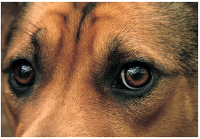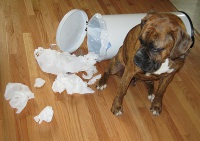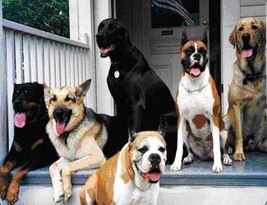Destructive chewing or scratching,  excessive barking, aggressiveness, inappropriate urination or defecation, digging, and spraying are some of the ways your dog or cat may be acting out.
excessive barking, aggressiveness, inappropriate urination or defecation, digging, and spraying are some of the ways your dog or cat may be acting out.
Fear, stress, nervousness, and separation anxiety are common in many pets and can lead to unwanted behavior. Sometimes poor internal health, environmental toxins, and prescription drugs are also the cause. Poor breeding practices and insufficient psychological stimulation can be contributing factors. So can excessive and improper doting.
 We sometimes have a hard time understanding what is wrong with our pet, and what they need us to do to rectify the situation. Trainers are a good resource to consult with because they are often experienced in this area.
We sometimes have a hard time understanding what is wrong with our pet, and what they need us to do to rectify the situation. Trainers are a good resource to consult with because they are often experienced in this area.
If the problem is an internal discomfort or toxicity, a switch to a natural diet and an elimination of the environmental hazard ought to help and may even put an end to the unwanted behavior.
Most of the time, though, proper training is also a must. If you find that you are unable to train your pet, take your pet to an experienced trainer who you have talked with and who you believe in. Have them train you, as well. With awareness, positive reinforcement, and effective techniques, you and your pet will lead happier lives.
awareness, positive reinforcement, and effective techniques, you and your pet will lead happier lives.
Do not humanize your pet. They are not human. Work at understanding their world from a canine or feline point of view. We sometimes tend to spoil our pets because we love them so much. But, rather than spoiling, be understanding. Dogs, for example, will be nervous, fearful, and/or aggressive if we are not perceived as the alpha pet in their lives.
Make sure your pet is getting enough exercise. Even little dogs require activity, preferably outdoors in an environment relatively free of hazards such as tar and pesticides.
If your dog shows signs of separation anxiety – destructive behavior or excessive barking or whining – it’s important to realize that the dog isn’t “getting back at you.” Your pet is reacting in a state of panic.  There are a number of reasons this can happen, besides not being accustomed to being alone.
There are a number of reasons this can happen, besides not being accustomed to being alone.
First of all, dogs are naturally pack animals. They are not genetically wired to exist alone.
If you raised your dog from puppyhood, he is probably accustomed to your particular ritual. If, however, he was from the pound, your dog may have experienced some sort of trauma, and being left alone with no reassurance of whether anybody is ever coming back is sending him into a state of fear.
You may not want to acknowledge this because it’s costly, but if Rufus suffers from separation anxiety, the best thing to do is to put him in doggie daycare. Give him a pack. Give him a means to develop dog social skills. Give him a solution. Dogs aren’t people. If you say to Rufus, “You be good” or “I’ll be back soon,” he has no idea what you’re saying. He has no way of knowing if you’ll ever be back. A dog who has been raised by you will have been conditioned to expect that you will be back. But a dog who may have been abandoned by his last pack, his last two packs, his last three packs, by, perhaps, every pack member he’s ever bonded with, cannot be expected to understand that you will, indeed, come back to him when you leave.
knowing if you’ll ever be back. A dog who has been raised by you will have been conditioned to expect that you will be back. But a dog who may have been abandoned by his last pack, his last two packs, his last three packs, by, perhaps, every pack member he’s ever bonded with, cannot be expected to understand that you will, indeed, come back to him when you leave.
Another contributing factor can be confusion about pecking order. When your role as the alpha in the house isn’t firmly established, and the dog is confused about whether he is supposed to be the pack leader, anxiety will kick in when his pack member goes missing. If he believes he is the alpha, he will also believe it’s his job to manage the pack. With all behavioral problems, you must be clear in your actions – you must be the alpha animal. The primordial step is to believe, yourself, that you are the leader. Remain calm and assertive, always … for your pet’s sake.
 Lastly, don’t make a big deal about leaving and arriving. As the alpha animal of the house, when you come home, you should walk in calmly and proudly. If your dog is making a fuss, don’t acknowledge him. Don’t even look at him. We know it’s hard, because we want to show our love (and receive it), but because of your love for your dog, don’t pay attention to him when you come home. It’s in his best interest. Feel free to show him affection at other times, particularly when he is being good and calm. The point isn’t to deprive your pet of affection, it’s to bestow affection at times that condition the pet in a way that is most beneficial for that pet’s mental well-being. Think Pavlov.
Lastly, don’t make a big deal about leaving and arriving. As the alpha animal of the house, when you come home, you should walk in calmly and proudly. If your dog is making a fuss, don’t acknowledge him. Don’t even look at him. We know it’s hard, because we want to show our love (and receive it), but because of your love for your dog, don’t pay attention to him when you come home. It’s in his best interest. Feel free to show him affection at other times, particularly when he is being good and calm. The point isn’t to deprive your pet of affection, it’s to bestow affection at times that condition the pet in a way that is most beneficial for that pet’s mental well-being. Think Pavlov.
Herbal and Naturopathic Help
A healthy, raw, natural diet with all essential nutrients is imperative. A B complex supplement can help with stress disorders. Make sure water is from a pure source. Mostly, try your best to eliminate toxins, unhealthy chemicals, additives, and pollution from your pet’s environment.
Have your pet checked for internal complications. For example, a urinary tract infection may be the reason your cat isn’t using the litter box.
 If you feel that medicating your pet is necessary, here is a list of botanicals that have been known to help:
If you feel that medicating your pet is necessary, here is a list of botanicals that have been known to help:
- chamomile
- valerian
- skullcap
- passionflower
- oat grass or common oat tincture
Homeopathy
This category is too broad to specify homeopathic treatments. Consult a holistic veterinarian if you are considering putting your dog or cat on a behavior altering drug, or if you are at your wit’s end. He or she will be able to better pinpoint the underlying condition, and prescribe homeopathic treatment from there.
If you are worried about your pet undergoing a specific stressful situation, for example, a road trip for a pet who is unfamiliar with car travel, you can give
Aconitum napellus 30c to minimize fear and anxiety before the event. Give one tablet an hour before, another tablet immediately before, and then one tablet during the event, if necessary.